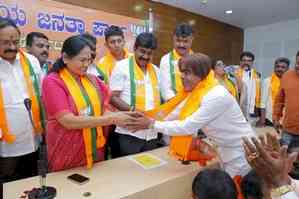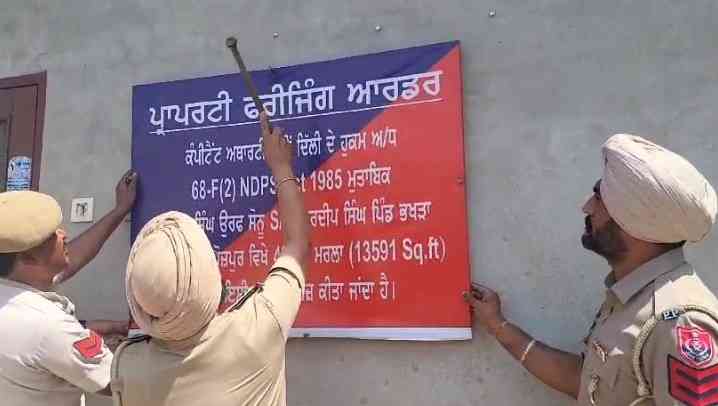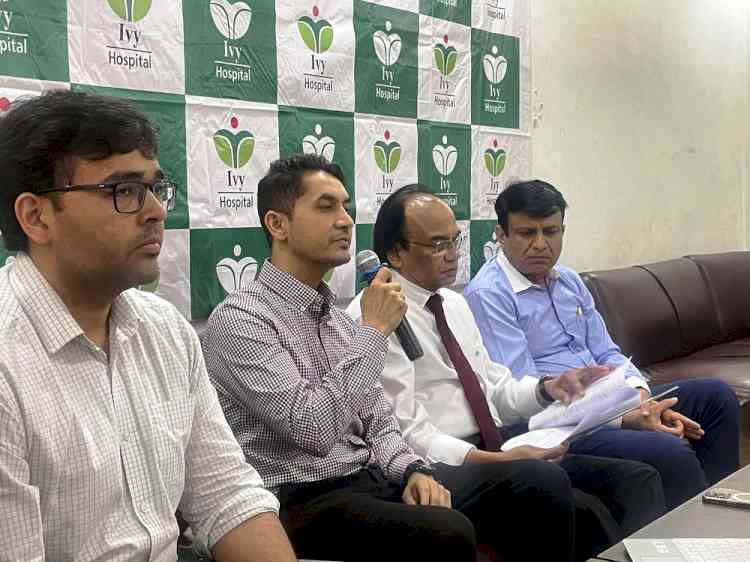SUKHBIR Launches unique statewide night patrolling scheme
Author(s): City Air NewsThe Punjab Deputy Chief Minister Sukhbir Singh Badal, inspecting the Highway Patrol vehicles equipped with mobile data terminal after inaugurating Highway Patrol Center at Khanpur T-Junction on Sunday. Khanpur (SAS...

The Punjab Deputy Chief Minister Sukhbir Singh Badal, inspecting the Highway Patrol vehicles equipped with mobile data terminal after inaugurating Highway Patrol Center at Khanpur T-Junction on Sunday.
Khanpur (SAS Nagar), July 14, 2013: Punjab became the first state in the country to have dedicated police force for effective night policing as the Punjab Deputy Chief Minister Sukhbir Singh Badal, who is also holding the charge of Home Minister, has formally launched Night Policing Scheme (NPS) with dedicated 4,000 police force with independent cadre, command and structure by flagging off a contingent of night patrolling vehicles and inaugurating Highway Patrol Centre at Khanpur ‘T’ point here today.
Later on interacting with media persons, the Deputy Chief Minister pointed out that the Night Policing Scheme (NPS) aims at augmenting and strengthening (through use of modern technology) the deployment of police personnel during night hours in the cities and towns of the State, as well as on the national and state highways and major roads of the State to instill a sense of security among the citizens of the State. He said that the coverage of NPS would extend to all entry/exit points, vulnerable points, sensitive institutions, and outlying residential colonies/areas etc., of all cities and major towns of the State.
The Deputy Chief Minister said that the prevention and control of street crime, which directly affects the citizens, especially vulnerable sections like women and senior citizens, such as snatching of bags, jewellery, mobile-phones etc. in broad daylight by motorcycle and scooter-borne youth, and organized/semi-organized gangs was a major challenge before our force in the recent past. He said that as a result of a concerted drive against such offenders in different districts, the snatching cases in the State have come down drastically.
Explaining the key objectives of NPS, Badal expressed confidence that it would give a fillip to night commerce and trade, and provide a security umbrella to restaurants, dhabas, eateries, street-hawkers, industrial labour and other night-shift workers such as doctors, nurses, Call-center employees, toll-barrier and excise barrier employees etc. This scheme was also aimed at prevention of offences such as thefts and burglaries, especially from banks and ATMs, carjacking, truck-jacking, robberies of high value items such as copper and nickel. Increased police presence at night would also serve to deter all kinds of criminal and anti-social elements as well as offences such drunken driving, over-speeding and rash driving, thus saving precious lives. It was also expected to curb smuggling, illicit distillation of liquor, boot-legging etc. It should also result in increased excise revenue collections by curbing economic offences and illegal mining, he added
Badal revealed that a proper supervisory structure was also being put in place to ensure proper supervision and control over the police deployment under the NPS. A Night Duty Roster would also be issued, mentioning the duties of SPs, DSPs, SHOs, and other police officers at night. A rotation system of duties has been worked out for ensuring adequate rest to the police force. The operation of the NPS would be monitored directly by senior police formations of the State on a daily basis.
He said that more than 4,000 police personnel, dedicated exclusively for night-time policing, would be out on the road and streets of the State at night, including the police deployment on 62 highway patrol vehicles, 22 ambulances, cranes and recovery vans. In addition, a large number of officers of various ranks would also be deployed in the districts every night. About 1,014 Police vehicles, both four-wheelers and motorcycles, carrying around 2500 police personnel would patrol the cities, towns, outlying colonies vulnerable points, and highways during the night hours. More than 350 static points would also be covered every night all over the State. 22 Ambulance Points have been set-up on various national highways and state highways of the State. Accident-prone road-stretches have been especially kept in mind for setting these ambulance points. Similarly, the present deployment of Police Control Room (PCR) vehicles and manpower would also be dovetailed with the Night time deployment to achieve best results. Traffic calming measures were being carried out at such stretches, alongwith the PWD and other agencies and departments of the state.
He further said that 7 Highway Patrol Centers (HPC) were also being set-up either at inter-state boundaries or accident-prone points. The highway patrol vehicles were in the process of being equipped with different kinds of security gadgets, such as Automatic Vehicle Locators (AVL), Mobile Data Terminals (MDT), ‘Police Line’ Tape Rolls, First-Aid kits etc. as technology enablers for the police personnel. It would be possible to track the location of Highway Patrol vehicles through AVLs, both at the State Command Centre as well as District Control Rooms. Mobile Data Terminals would enable the police personnel deployed on the HPV to check the ownership of suspicious vehicles on the spot.
The Deputy Chief Minister said that all the police personnel deployed under the Night Policing Scheme (NPS) would be equipped with fluorescent vests, reflective batons, LED torches, and suitable weapons. A separate and dedicated POL allocation is being made for NPS vehicles to ensure an adequate supply of POL in all districts of the state.
Sumedh Singh, Director General of Police, Punjab and Dinkar Gupta, Additional DGP/Security were present on the occasion.

 cityairnews
cityairnews 
















